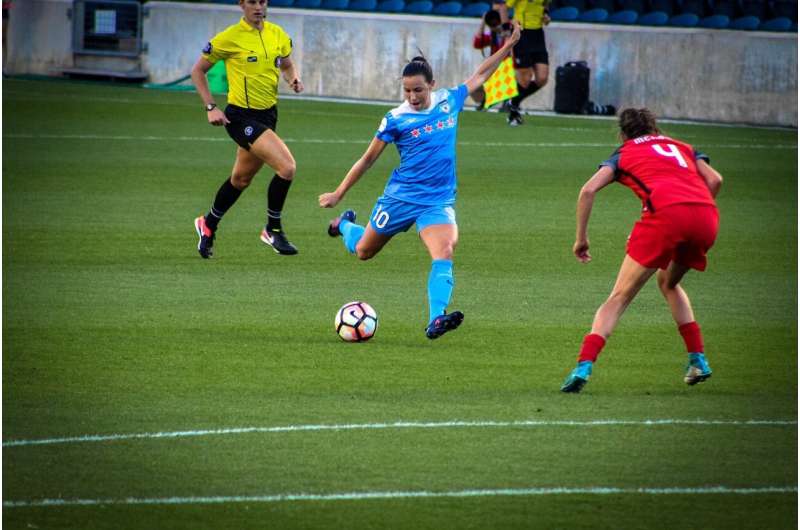The underrepresentation of women coaches in high-performance sports

In recent years, the popularity of professional women’s sports has soared. We’ve seen the expansion of women’s AFL, the creation of the women’s Indian Premier League in cricket, as well as things like the 2023 FIFA women’s world cup and the 2023 women’s rugby league season added to the prime-time television schedule.
However, behind the screen, underrepresentation of women coaches remains, according to new research published in the International Journal of Sports Science & Coaching and led by UNE’s Dr. Ben Serpell, Professor Christian Cook, and colleagues Darlene Harrison and Rae Dower.
We recently had a chat to Dr. Serpell, Lecturer in the School of Science, to better understand why this situation continues to exist, and the implications it has for elite sports. See what he had to say below.
What are the key takeaways from this research?
It is really important to realize that diversity brings innovation, and innovation often brings success. However, in sports, diversity is lacking, and we note that if we cannot achieve appropriate representation across genders, what hope do we have to achieve appropriate representation and diversity across other minority groups? This paper is written in the context of underrepresentation of coaches that identify as women, however it highlights that diversity across many groups is lacking.
We discuss leadership development and highlight that often we can perpetuate issues that surround underrepresentation of women by singling women out. Development opportunities and programs should be individualized and ensure all people, including people with a gender diverse background, are afforded equal opportunities to take part in development.
Finally, we speak about the importance of environment, and are strategic in using the term ‘environment’ as opposed to culture. Culture is part of the environment. The culture could be “okay,” however, other, simple environmental issues, such as appropriate bathroom and changing facilities, may hinder gender diversity progress. Hence, we believe environment is important…not just culture.
Why is there an underrepresentation of women and minority groups in elite sports and coaching leadership?
There could be a number of reasons for this, most likely related to sociocultural norms. Some related sexism, racism, ageism and other forms of prejudice remains, and I hear many stories of this still occurring in professional sports. However, it is also important to highlight that it is a really hard industry for anyone wanting to commit time to their family across genders. Elite and professional sports does not lend well to ‘non-traditional’ working arrangements (for example, job sharing, work from home etc.), which is a little paradoxical because often in elite sports there is a requirement to work irregular hours including evenings and weekends.
What are some of the things coaches and performance staff can do to shape change and foster inclusive environments?
We need to have leaders within organizations who champion increased diversity and appropriate representation of minority groups. We also need the environment (not just culture) to be more inclusive. We don’t speak about this much in the paper, however, anecdotally, we know that men who outwardly demonstrate (what is perceived as) more ‘less masculine traits’ may be ‘penalized’ in some work places in terms of development opportunities and progression.
What this tells us is that the issue of underrepresentation of minority groups includes problems of the environment. People do not need to be ‘fixed’ to make them more like an anachronistic stereotype of a coach, rather, the environment needs to adjust to be more inclusive.
For all people coming up the ranks, how important is it to have a diverse range of mentors and role models? Are there any specific challenges women may face?
The paper clearly states that it is not enough to simply be mentored. Many mentors are great in supporting development, but often there is a need for further advocation. It is important to have sponsors as well as mentors (from within and outside of one’s own organization), because sponsors will advocate for you and help you secure opportunities for development and advancement. It is possible in some industries that women tend to be over mentored but under sponsored.
What do you hope to see happen in the future in this space, and what areas could be further explored?
At the very least, I’d like for this to encourage more conversation about how to increase diversity in elite and professional sports. But, more importantly, I hope this can lead to environmental change, and that it is a great source of information for leaders in sports so that they can understand some of the challenges that women leaders and coaches face.
More information:
Benjamin G. Serpell et al, The under representation of women coaches in high-performance sport, International Journal of Sports Science & Coaching (2023). DOI: 10.1177/17479541231160229
Citation:
The underrepresentation of women coaches in high-performance sports (2023, May 8)
retrieved 8 May 2023
from https://phys.org/news/2023-05-underrepresentation-women-high-performance-sports.html
This document is subject to copyright. Apart from any fair dealing for the purpose of private study or research, no
part may be reproduced without the written permission. The content is provided for information purposes only.
For all the latest Science News Click Here
For the latest news and updates, follow us on Google News.

